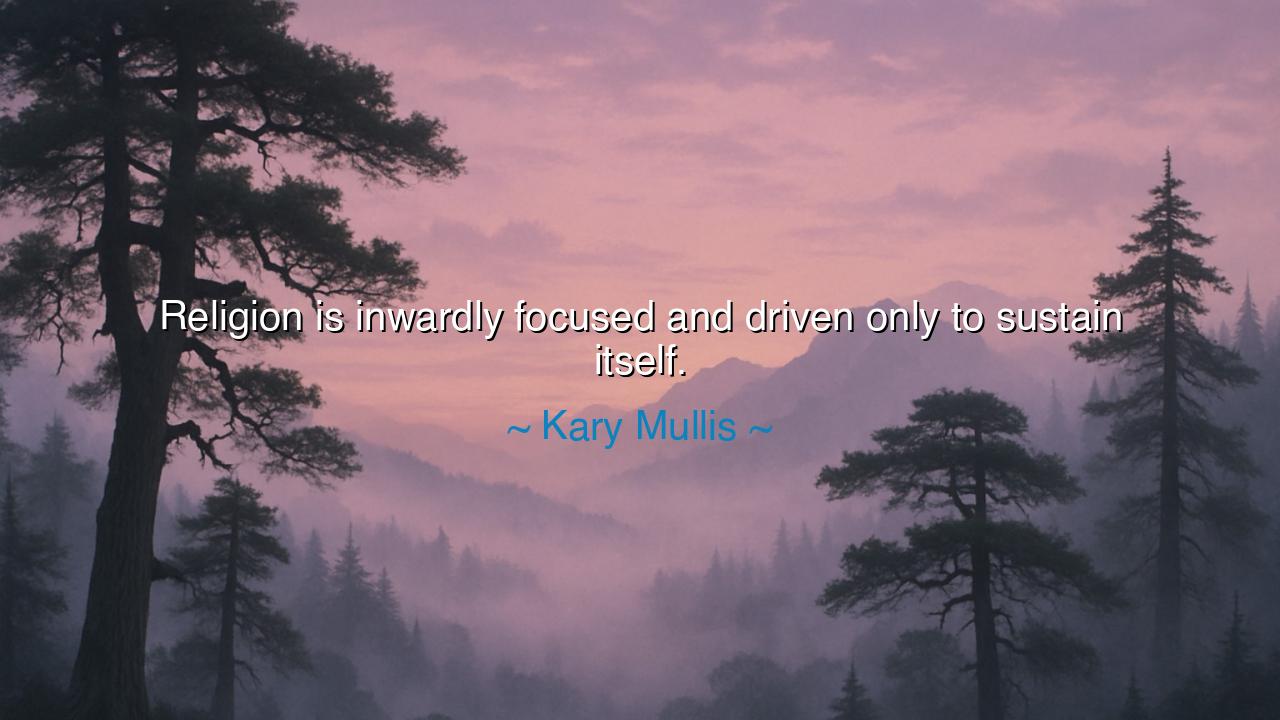
Religion is inwardly focused and driven only to sustain itself.






Kary Mullis, the restless seeker and fearless voice of science, once declared: “Religion is inwardly focused and driven only to sustain itself.” In these words, he did not condemn all faith, but he revealed a hard truth: that many systems of religion, once born in fire and vision, become more concerned with their own preservation than with the liberation of the human spirit. What begins as a living stream of wisdom can harden into an institution, seeking survival above service, power above compassion. Thus Mullis speaks to the danger of inwardness—that a faith turned solely upon itself forgets the world it was meant to heal.
The ancients knew this danger well. The prophets of Israel cried out against priests who clung to rituals while justice was neglected. Christ rebuked the Pharisees for polishing the outside of the cup while the inside was full of decay. The Buddha warned his disciples not to cling to dogma like a raft, once it had carried them across the river of ignorance. Again and again, history shows that religion can begin as a torch in the darkness, but if it turns inward, if it burns only to protect itself, it ceases to give light and becomes a consuming fire that devours its own followers.
Consider the story of the medieval Church before the Reformation. Once a beacon of learning and compassion, it grew heavy with wealth, indulgences, and hierarchy. It became inwardly focused, defending its authority against all dissent. When Martin Luther nailed his ninety-five theses to the church door, he did so not to destroy faith, but to call it back to its true mission: service, humility, and the pursuit of truth. Here we see Mullis’s warning embodied—an institution that clung to survival at the expense of its soul, until voices of courage forced renewal.
Yet, O listener, do not take Mullis’s words as a reason to despise all religion. The truth he speaks is not that all faith is false, but that faith must constantly guard against decay. For what is meant to lift man toward the divine can become a prison if it is obsessed with its own endurance. Religion that exists only to preserve itself has forgotten the heart of its message. But religion that pours itself out in compassion, that feeds the hungry, clothes the poor, and heals the broken—that is faith alive, faith outwardly focused, faith that sustains not itself but the world.
History also gives us luminous examples. Think of Saint Francis of Assisi, who stripped himself of wealth and chose poverty, not to sustain the Church’s power, but to live in solidarity with the poor. His life was a protest against inwardness, a reminder that faith must serve rather than cling. Or think of Mahatma Gandhi, who took the spiritual disciplines of Hinduism and turned them outward into a movement of nonviolence, setting a nation free. These show us what religion becomes when it looks beyond itself: not a self-preserving shell, but a force that transforms history.
The lesson is clear: beware of any path, whether religious or not, that seeks only its own survival. For truth and goodness do not need to cling; they endure by giving themselves away. If you find yourself part of a community that is obsessed with defending its walls, ask whether the true fire has been lost. And if you practice faith, let it be faith that looks outward—toward love, toward justice, toward the flourishing of life.
Practical wisdom flows from this: when you pray, let your prayer make you kinder. When you study, let your knowledge make you more just. When you gather in community, let your gathering serve not only yourselves but the world outside your doors. In this way, faith is kept alive not by sustaining itself, but by sustaining life.
So remember, O children of tomorrow: religion that turns inward withers, but religion that gives outward endures. Guard yourselves from hollow ritual, from prideful preservation, from empty defense of structures. Instead, kindle your spirit with love, and pour it forth into the world. For only by serving others does faith sustain itself—and in giving, it becomes eternal.






AAdministratorAdministrator
Welcome, honored guests. Please leave a comment, we will respond soon